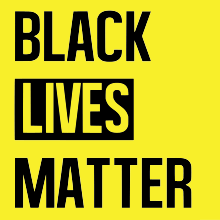The Seven Last Words of the Unarmed
The Seven Last Words of the Unarmed is a choral composition by Atlanta-based composer Joel Thompson.[1][2]
The piece contains seven movements, each of which quotes the last words of an unarmed black man before he was killed.[3] Thompson has said that in composing the piece, he "used the liturgical format in Haydn's Seven Last Words of Christ in an effort to humanize these men and to reckon with my identity as a black man in this country in relation to this specific scourge of police brutality."[1] He was also inspired by the illustrations of Iranian-American artist Shirin Barghi.[4][5]
It was premiered in 2016 by the University of Michigan Men's Glee Club under the direction of Eugene Rogers.[6][7] Rogers said,
"...I hesitated before taking it to my glee club; I did not want them to think I was pushing an agenda. At the same time, repertoire that deals with issues of social justice is important to me, a part of my philosophy of teaching. It engages our audience, builds a strong sense of community amongst our singers, and can foster musical ubuntu. As Nelson Mandela defined the philosophy, ubuntu holds that our personal humanity is dependent on the humanity of others. Providing a safe place for students to express and process issues that affect us all can be very rewarding and act as another vehicle for bringing change to our world. With all of that in mind, I decided to introduce the piece to the chorus. Initially, some members felt performing it would be overly political. We talked about their concerns, and some wrote essays about them. Together we found resonance in the central theme of loss, and that enabled us to get through the journey. Some of our audience expressed similar misgivings, but most of the response was extremely positive."[8]
The song has also been performed by the Tallahassee Symphony Orchestra (with The Village Square, the Florida A&M Concert Choir, the Morehouse College Glee Club),[3] the Chicago Sinfonietta,[9] the Boston Children's Chorus,[10] and the San Francisco Gay Men's Chorus.[11] The work has been subject to renewed interest in 2020 [12][13][14][7] after the killing of George Floyd and the subsequent protests and outbreak of police violence. The song is often followed by a performance of the song "Glory," from the 2014 film Selma. Said Rogers,
"The impact of 'Seven Last Words of the Unarmed' is sobering, as it ought to be, but at the premiere we wanted to leave our audience with a message of hope. With that in mind, we transitioned without pause to a choral arrangement of 'Glory,' which John Legend and Common wrote for the film Selma. After experiencing that approach, Joel Thompson has asked that his piece be paired with 'Glory' in all future performances."[8]
Movements
- “Why do you have your guns out?” – Kenneth Chamberlain, 66
- “What are you following me for?” – Trayvon Martin, 17
- “Mom, I'm going to college.” – Amadou Diallo, 23
- “I don't have a gun. Stop shooting.” – Michael Brown, 18
- “You shot me! You shot me!” – Oscar Grant, 22
- “It's not real.” – John Crawford, 22
- “I can't breathe.” – Eric Garner, 43[3]
References
- Goldberg, Daniel (2019-12-11). "Creating a Space for Empathy: Composer Joel Thompson speaks about The Seven Last Words of the Unarmed". WFMT. Retrieved 2019-12-14.
- Grimes, Ryan (2016-04-26). "UM Men's Glee Club remembers lives lost with "Seven Last Words of the Unarmed"". Michigan Radio. Retrieved 2019-12-14.
- "Ode to Understanding". Tallahassee Symphony Orchestra. Retrieved 2019-12-14.
- "Noteworthy: A Reminder that "Art Should Not Always Be Comfortable" | Chorus America". www.chorusamerica.org. Retrieved 2020-06-12.
- "Shirin Barghi". Shirin Barghi. Retrieved 2020-06-12.
- Hawkins, Sydney (2016-04-19). "Social justice + music: 'Seven Last Words of the Unarmed' premieres at U-M". Michigan News. Retrieved 2019-12-14.
- June 4; 2020. "'Seven Last Words of the Unarmed' project adds educational resources | U-M School of Music, Theatre & Dance". University of Michigan School of Music, Theatre & Dance. Retrieved 2020-06-11.CS1 maint: numeric names: authors list (link)
- "Noteworthy: A Reminder that "Art Should Not Always Be Comfortable" | Chorus America". www.chorusamerica.org. Retrieved 2020-06-12.
- "Review: Chicago Sinfonietta: In 'Seven Last Words of the Unarmed,' a sobering, potent tribute to Dr. King". Opus 3 Artists. 2020-01-21. Retrieved 2020-06-12.
- Kogan, Judith (2017-01-16). "Undeniable Power: 'Seven Last Words' Of Unarmed Men". WGBH. Retrieved 2019-12-14.
- "SFGMC Presents "Bridges" - Thursday, March 29, 2018". SFGMC. Retrieved 2020-06-12.
- https://www.clickondetroit.com/all-about-ann-arbor/2020/06/05/social-justice-music-project-debuted-at-u-m-back-in-national-spotlight-amid-protests/
- https://www.wqxr.org/story/hear-me-out-seven-last-words/
- https://www.sfcv.org/article/recommended-streaming-from-the-interwebs
